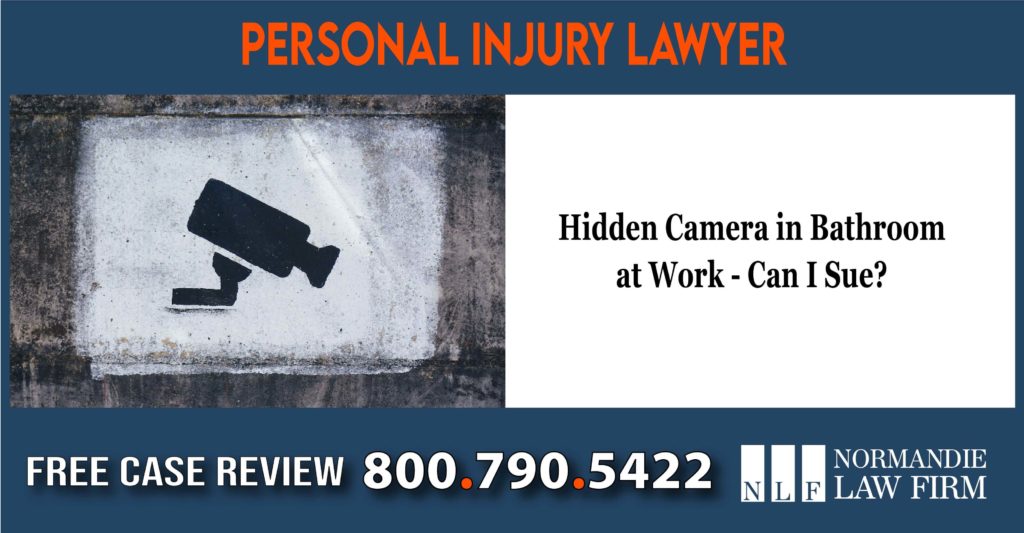We take it for granted that security cameras are everywhere these days, especially with the internet and online apps that make these devices easier to use than ever. Even when cameras are not visible, we are often met with signs to indicate that a property is under surveillance at all times. Properties that are monitored by cameras include workplaces, especially office buildings and retail settings like stores and restaurants.
Video monitoring in the workplace has many benefits, including the prevention of theft, vandalism, and violence. At the very least, they reduce these incidents or catch the perpetrator in the act, which is helpful to the business or any other victim of a criminal incident. However, there are limitations on the usage of video cameras in the workplace, including what rooms and spaces they can be installed in. This is an important issue with hidden cameras, where the employee has no idea that they’re being monitored.
Did you discover a hidden camera at work and feel that your privacy has been violated? If so, you may be wondering “Can I sue? What are my rights?” The labor law attorneys of Normandie are here to explain your rights and help you take action if your employer is recording you without consent. To discuss a hidden camera in bathroom at work incident, contact us right away to schedule a free case evaluation.

Our Recent Verdicts and Settlements
$2.5 Million
$1.1 Million
$1.5 Million
$600,000
$525,000
$734,851
Is it Legal for Employers to Place Cameras in the Bathrooms?
No, employers have no right to install cameras, hidden or in plain sight, inside employee bathrooms. California law clearly states that video monitoring is not allowed in places where one has a “reasonable expectation of privacy.” Such places include bathrooms, locker rooms, and changing areas. There are some gray areas, like breakrooms and kitchens, but there is no disputing that surveillance cameras are illegal inside bathrooms.
So, when is it legal for an employer to monitor you with surveillance cameras? Are they allowed to place cameras in common areas, like meeting rooms and hallways, without your consent?
When are Employers Allowed to Video Monitor Their Employees?
California law allows three conditions under which employers can monitor their employees through surveillance cameras in the workplace:
- The presence of surveillance cameras on the property has been disclosed to the employee.
- The employee has given their consent in writing, i.e., they understand that their employment is conditional upon being video monitored.
- The employer has obtained a court order that allows them to monitor certain areas in the workplace.
As you can see, all these conditions require that notification of cameras at the worksite is provided to the workers (or prospective employees). The employer is not required to disclose the exact location of the cameras, but most places put up signs in rooms or spaces that are under surveillance as a courtesy.
Even if consent was obtained from the employee, it is still illegal to video record people in places such as bathrooms, where one expects to have a certain level of privacy. Employers can only put cameras in these locations if they have a court order, but these are only granted in rare and exceptional circumstances.
What Do I Do if I Find a Hidden Camera in the Bathroom at Work?
Clearly, finding that you are being secretly recorded is an unnerving situation. Though you may be tempted, never touch or move the camera. Instead, make note of the camera’s location or take a photo of it and the surrounding area if you have your phone with you.
Since the bathroom is an area where security cameras are generally not allowed, you should go ahead and contact the police. For one thing, it’s possible that someone other than your employer had placed the camera there (a coworker, janitor, etc.). If so, it’s important to have the authorities investigate the incident and try to apprehend the individual.
If, on the other hand, it was your employer that placed the camera in the bathroom, it’s still in your best interest to contact the authorities. That way, you can obtain evidence that the company violated your right to privacy. If it’s clear that your privacy rights in the workplace were violated, you would have grounds to file a lawsuit against your employer.
How an Employment Rights Attorney can Help
If your right to privacy at work was violated, you may be thinking, “Do I need to get a lawyer?”
Ultimately, finding legal representation is up to you, but these are incredibly complicated cases. There are many misconceptions about privacy laws, especially in the workplace. A lawyer experienced with hidden camera in bathroom at work and other cases of illegal workplace monitoring is your best source of information. In addition, they can advise you on the available legal options based on your circumstances and ensure that you take the right steps to build a strong and solid case. They can also help you if you are facing workplace discrimination, harassment, termination, or any other consequences from speaking to the authorities.
The employment rights lawyers of Normandie have decades of experience in complex labor disputes, including illegal video monitoring in bathrooms at work. During a free consultation, we can take the time to answer all your questions and ensure that you have a full understanding of your legal rights. If taking legal action is right for you, we will develop a strategy to hold your employer accountable for their actions. Then, we will fight tirelessly to bring you compensation for the emotional and financial harm that was caused by this intrusion into your privacy.
Other Examples of Privacy Invasion in the Workplace
Hidden video cameras in the bathroom at work is not the only way an employer can violate your privacy. Here are some other examples of privacy violations that can serve as grounds for a lawsuit against your employer:
- Remotely monitoring you through cameras on work laptops and cell phones without your permission
- Your employer has hired someone to monitor your activities outside of work
- Public disclosure of private information, i.e., publicizing information about your sexuality, sex life, health, or financial situation.
- You were asked to submit to a medical examination, but were not told there would be a drug test. Later on, you were fired because the exam detected drugs in your system.
Contact a California Labor Law Attorney
Exploitation in the workplace can take place in many ways, including illegal video recording of employees. Installing video cameras in the bathroom is a particularly heinous act, as people are at their most vulnerable in these areas. These are generally clear cut cases of privacy invasion, and you are entitled to justice as someone whose rights were violated.
We understand the humiliation and anger you may be feeling right now, but it’s essential to contact a seasoned invasion of privacy lawyer right away. This is the best way to provide yourself with safety and security as you fight for compensation from an illegal recording in the workplace lawsuit.
Our law firm offers a Zero Fee Guarantee on all cases, meaning you will never be responsible for the cost of legal fees. That responsibility falls on your employer, and we receive payment at the same time you are compensated from a successful workplace privacy violation lawsuit. Otherwise, we don’t make a single penny, since we shouldn’t get paid unless you do.
All it takes is a call to our office so that you can schedule a free case review with one of our experts. Or, if you need a second opinion on your invasion of privacy lawsuit, we can help you with that as well. Contact Normandie Law Firm and speak to a lawyer with experience in California labor law violation cases.













